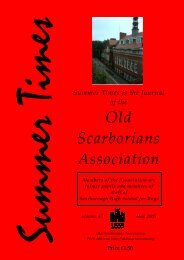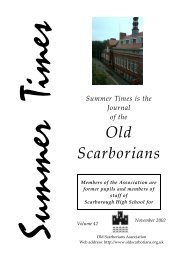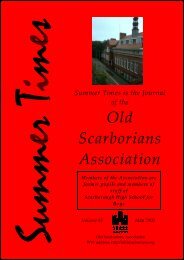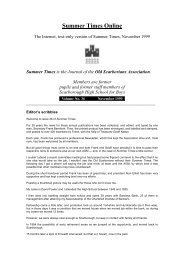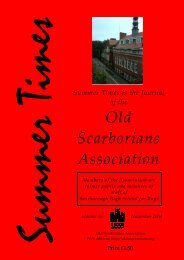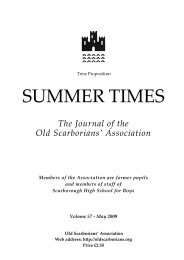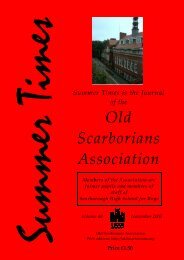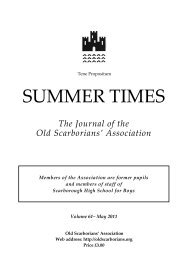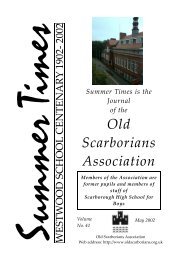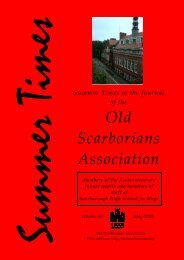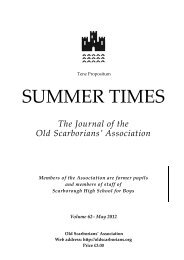Summer Times is the Journal of the Old Scarborians Association
Summer Times is the Journal of the Old Scarborians Association
Summer Times is the Journal of the Old Scarborians Association
Create successful ePaper yourself
Turn your PDF publications into a flip-book with our unique Google optimized e-Paper software.
There were some great players before my<br />
arrival at <strong>the</strong> school, most notably Ted Lester<br />
(<strong>of</strong> whom more later), Jack Pearson, who bat‐<br />
ted brilliantly for <strong>the</strong> town team in <strong>the</strong> pre‐<br />
war years, and John Temple, a slow left‐arm<br />
spinner who played for Yorkshire several<br />
times in <strong>the</strong> 30s.<br />
Players I looked up to as giants when I first<br />
became interested in cricket were Mick Her‐<br />
man, Bill Hume (a member <strong>of</strong> <strong>the</strong> 1 st XI for a<br />
record five years), F. M.‘Tank’ Vokes, Bill<br />
Temple, Ken Newton and ‘Lit’ Horswood.<br />
The last <strong>of</strong> <strong>the</strong>se appeared to me <strong>the</strong>n to be<br />
literally a giant. He seemed to be about seven<br />
feet tall, and brought <strong>the</strong> ball down from a<br />
towering height at what seemed to me, as a<br />
thirteen‐year‐old, an awesome pace. In <strong>the</strong><br />
1948 season, he took 68 wickets in 14 games at<br />
an average <strong>of</strong> 3.86, including 7 for 6 against<br />
Malet Lambert.<br />
Vokes, a left‐arm bowler <strong>of</strong> a more compact<br />
build and with an aggressive charge up to <strong>the</strong><br />
wicket, was also frighteningly fast, an excel‐<br />
lent batsman, and captained <strong>the</strong> 1 st XI in 1945,<br />
h<strong>is</strong> fourth year in <strong>the</strong> team..<br />
Newton was a superb all‐rounder with a clas‐<br />
sic fast bowler’s action and a thoroughbred<br />
batting style. When still in <strong>the</strong> fourth form, he<br />
played for <strong>the</strong> 1st XI and took 51 wickets in 14<br />
games at an average <strong>of</strong> 3.8, (including 6 for 5<br />
and 6 for 4 against Newburgh Priory). He was<br />
so good that, while still at school, he was said<br />
to have been invited to play for Yorkshire<br />
Colts, but was unable to do so, because Mars‐<br />
den wouldn’t let him take <strong>the</strong> time <strong>of</strong>f. I <strong>of</strong>ten<br />
wonder whe<strong>the</strong>r he later fulfilled h<strong>is</strong> early<br />
prom<strong>is</strong>e.<br />
Bill Temple I remember as a cultured bats‐<br />
man, and Herman and Hume were a very<br />
sound opening pair, who both eventually<br />
captained <strong>the</strong> side. Years later I had <strong>the</strong> great<br />
pleasure <strong>of</strong> joining Mick’s Queen’s College,<br />
Oxford, team as a guest player on <strong>the</strong>ir York‐<br />
shire tour. Hume I remember best for h<strong>is</strong><br />
extraordinary wicket‐keeping style. He stood<br />
sideways, facing first slip, and I have since<br />
32<br />
wondered how he managed to take anything<br />
down <strong>the</strong> leg side. Mick Herman remembers<br />
that he did stop a lot <strong>of</strong> balls with h<strong>is</strong> legs.<br />
These are players I remember from my early<br />
school days, but <strong>the</strong>re were o<strong>the</strong>rs who were<br />
also outstanding, but who didn’t seem to have<br />
reg<strong>is</strong>tered in my very junior brain. For in‐<br />
stance, Den<strong>is</strong> Saunders, a good batsman but<br />
more noted for h<strong>is</strong> footballing prowess, came<br />
on <strong>the</strong> scene in 1941, my first year at SBHS,<br />
and was captain in ’42, ’43 and ’44, having<br />
played for <strong>the</strong> first team for five seasons..<br />
Also in 1941, The Scarborian reported ‘Bill<br />
Foord bowled h<strong>is</strong> way through a glorious<br />
season, taking 50 wickets at a little over six<br />
runs each.’ He, <strong>of</strong> course, was a sixth former,<br />
and as a mere lower prep pip‐squeak, I didn’t<br />
see him play <strong>the</strong>n. But years later I had <strong>the</strong><br />
privilege <strong>of</strong> playing alongside him for Scar‐<br />
borough.<br />
I can see him bowling now. A tall, wiry fig‐<br />
ure, glasses glinting in <strong>the</strong> sun, <strong>the</strong> straight<br />
upright run, <strong>the</strong> ball clutched somewhere near<br />
h<strong>is</strong> midriff up to <strong>the</strong> moment before delivery<br />
when he stretched to <strong>the</strong> limit <strong>of</strong> h<strong>is</strong> consider‐<br />
able height before <strong>the</strong> full straight follow‐<br />
through <strong>of</strong> h<strong>is</strong> classic action. He was without<br />
question <strong>the</strong> finest bowler ever to play for <strong>the</strong><br />
town team, and few bowlers could swing <strong>the</strong><br />
ball extravagantly ei<strong>the</strong>r way at will as he did<br />
if <strong>the</strong>re was <strong>the</strong> slightest help in <strong>the</strong> seaside<br />
atmosphere. Not surpr<strong>is</strong>ingly, he had quite a<br />
few games for Yorkshire, and was at one time<br />
spoken <strong>of</strong> as ‘<strong>the</strong> next Bill Bowes’.<br />
I shall never forget my shock when, in a de‐<br />
scription <strong>of</strong> h<strong>is</strong> bowling in a county match, <strong>the</strong><br />
Yorkshire Post referred to him as ‘medium‐<br />
paced’. I have to say it never felt like that<br />
when I batted against him in <strong>the</strong> nets.<br />
Two more notable names, Albert Marston and<br />
Reg Atkinson, appeared in <strong>the</strong> 1 st XI report in<br />
The Scarborian in 1941. Albert was <strong>the</strong> wicket‐<br />
keeper and got a surpr<strong>is</strong>ing number <strong>of</strong> vic‐<br />
tims. Like Foord, he later played many sea‐<br />
sons for Scarborough. However, I have to say<br />
that, though he was a very congenial team‐



